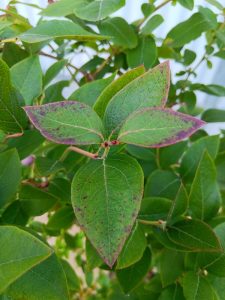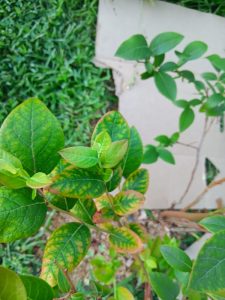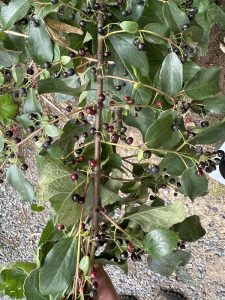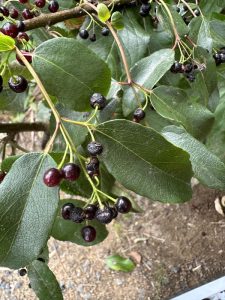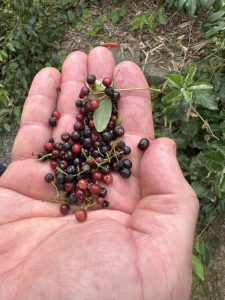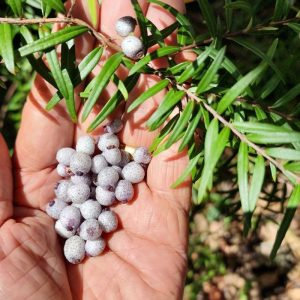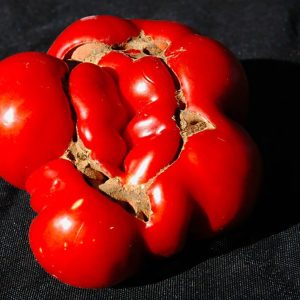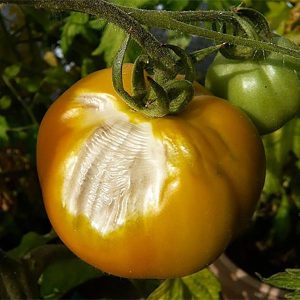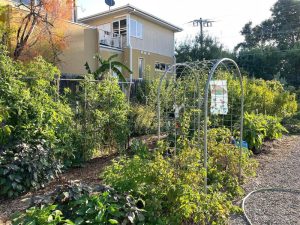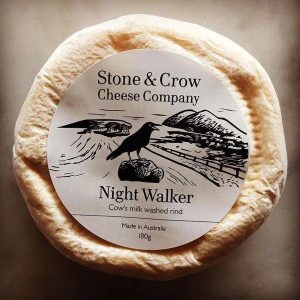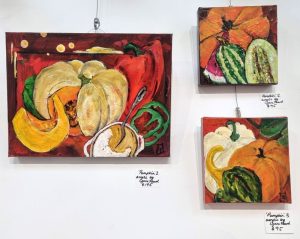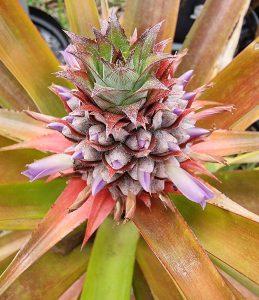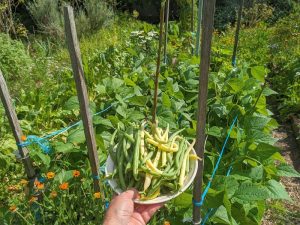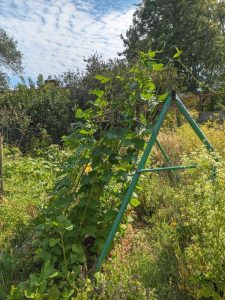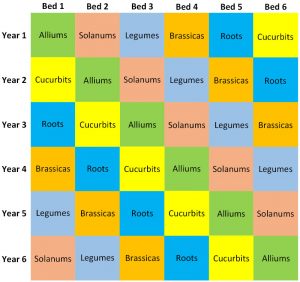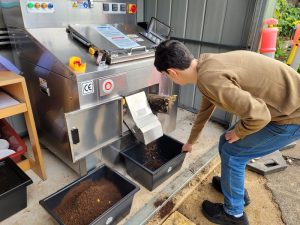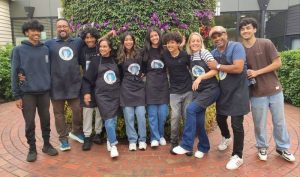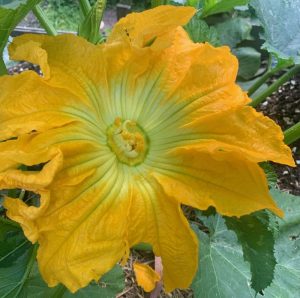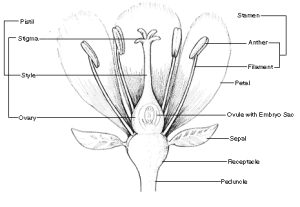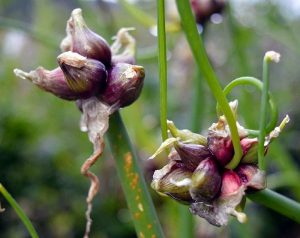Thanks to the people who have contributed to this week’s newsletter: Benson Bannon, Bev Middleton, Bienne Tam, Helen Vander-Heyden, Meg Autin, Olwyn Smiley, Robin Gale-Baker and Sarah Willits.
Take action now to prevent QFF in your garden next season (by Robin Gale-Baker)
If you were hit by an outbreak of Queensland Fruit Fly (QFF) this season, now is not the time to give up. In fact, it is the time to get busy to lower your risk of an outbreak next season.
The key task is to prevent QFF larvae pupating in the soil. If there is no QFF emerging from your soil next spring, then you are well ahead when it comes to a QFF-free orchard and veggie garden. And, you really don’t want to be spending money on lures for QFF that you have bred yourself!
To this end, pick up any fallen fruit daily and strip any fruit tree plus any tomato, chilli and capsicum plants that are infested. Larvae will emerge quickly from fruit laying on the ground (and can even drop from trees) and will burrow into the soil, beginning the long pupation process to emerge next season. This fruit should be:
- Double bagged in black plastic and put in a sunny place for 14 days to solarise the fruit and kill the larvae; or
- Frozen for 48 hours; or
- Microwaved for 10 minutes; or
- Baked in a hot oven for 10 minutes.
Place the treated fruit and vegetables in the waste bin – not in the green bin.
Do not compost fallen or infected fruit. Compost is QFF heaven! They breed in the warmth of the heap and, as you spread your compost, you also spread QFF. Make sure that any vegetable matter is buried in your heap and not exposed to QFF. Also, avoid pulling out plants such as tomato vines with fruit attached and leaving these on the ground. Bin them straight away.
Females will die off in autumn so, if no females are pupating in the soil, you only need deal with the males. Most males will die before winter, but some young males will survive, over-wintering in groups (leks) of about 10 in the canopy of trees, in particular lemon trees. In mid-autumn, place lures with Wild May in them in the canopy of lemon trees (if you have them) or other trees (otherwise) at a height of 1.5-2 metres, to deal with the males. Check the lures weekly as the liquid evaporates.
Wild May is a pheromone that smells like the female and attracts the males. It is organic. It can be difficult to find but should be available from the Sustainable Macleod shop in the autumn at cost price.
If you have chooks (or can borrow some short term) then you are in luck. Chooks scavenge for larvae and will clean the soil like no other. They are truly the gardener’s best friend in relation to QFF.
It can be very discouraging to endure a QFF outbreak and I have heard many a person say that they are ‘giving up for this season’. But that will simply prolong the agony into the following season. Good garden hygiene, proper disposal of infected fruit and using lures proactively during autumn and winter will position you well for a great harvest next summer.
Two new community gardens in Yarra Ranges
Lilydale
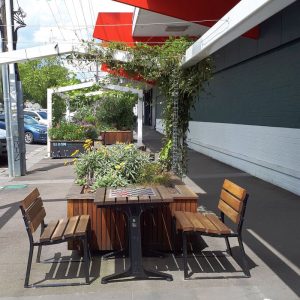 At 118 Main Street, Lilydale (outside of Bunnings). This garden is open to the public 24/7. To discuss any aspect of the garden, contact Benson Bannon by phone (0448 150 887) or email. Also, see their Facebook page.
At 118 Main Street, Lilydale (outside of Bunnings). This garden is open to the public 24/7. To discuss any aspect of the garden, contact Benson Bannon by phone (0448 150 887) or email. Also, see their Facebook page.
Lilydale Community Gardens comprises a series of planter boxes on the footpath along the main road. Each of these boxes is a wicking bed. Herbs such as rosemary, mint, oregano and sage are grown, along with some small vegetables and some bee-attracting plants with flowers. There are also two olive trees growing in tubs. Seating is provided, including some with chessboard tables.
Some of the gardeners get together on the 2nd Saturday of each month at 11am for coffee and chat.
Read their page on our website.
Welcome to Benson and colleagues!
Mooroolbark
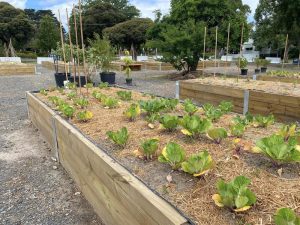 At 11-21 Charles Street (corner Charles and Station Street), Mooroolbark. This garden is open to the public 24/7. To discuss any aspect of the garden, contact Helen Vander-Heyden by phone (0407 405 665) or email. Also, see their Facebook page.
At 11-21 Charles Street (corner Charles and Station Street), Mooroolbark. This garden is open to the public 24/7. To discuss any aspect of the garden, contact Helen Vander-Heyden by phone (0407 405 665) or email. Also, see their Facebook page.
The garden is almost an acre in size and includes 12 large raised beds, all of which are communal. The aim is to provide a locally grown, organic, ethical, environmentally friendly, healthy, sustainable and self-funded community food source. Plus it is a place of being and sharing skills, knowledge and ideas for local community members of all ages, genders, ethnicity and abilities. They have a polytunnel where they grow veggie seedlings for sale and any excess produce is also available for sale.
The garden was opened in 2023 and is on a temporary site pending the Council deciding what to do with the site longer term.
There is a gardening club that meets every Wednesday morning 10am-midday. There is usually also someone there on Thursday mornings, 10am-midday, who you can chat with. For anyone that wants to be involved in the garden, they ask that you become a member in order to facilitate communications. Annual membership is $15 ($30 for families and free for concession card holders).
Read their page on our website.
Welcome Ayala, Caroline, Helen, Lorraine, Rhonda, Ronen, Tracey and colleagues!
Some other community garden news
Watch this video about the recent upgrade to the Brunswick Neighbourhood House Community Garden.
Croxton Community Garden / Marra Guwiyap Garden in Northcote has posted a number of photos from their recent working bee.
Pentridge Community Garden in Coburg have recently received a batch of mushroom compost from the Mushroomery.
Do you know?
Meg Autin’s blueberry leaves have been looking like in the photos below for a few weeks now. What might be the cause(s)? Email me with your responses.
The program for the 2024 National Sustainability Festival is now available
Read the program on their website. All the events will take place during February and the main events are in Melbourne CBD, most notably at the botanical gardens.
At least as far as the food-related events outside of the CBD, most are events that were happening anyway and have been previously announced in this newsletter. The main exception is
A tour of ‘the Plummery’ (garden tour), which will be happening multiple times during the month.
Chestnuts at Mt Dandenong
 In the autumn of 2022, Judy Vizarri visited a property in Mt Dandenong and collected chestnuts. She then wrote up her visit for our website. A year later, in the autumn of 2023, Bienne Tam visited the same property and her writeup is now available on our website. Both articles are rather complimentary. If you would like to visit and collect chestnuts in the autumn of 2024, the owner’s name is Sylvie and her email address is sylvie9274@gmail.com.
In the autumn of 2022, Judy Vizarri visited a property in Mt Dandenong and collected chestnuts. She then wrote up her visit for our website. A year later, in the autumn of 2023, Bienne Tam visited the same property and her writeup is now available on our website. Both articles are rather complimentary. If you would like to visit and collect chestnuts in the autumn of 2024, the owner’s name is Sylvie and her email address is sylvie9274@gmail.com.
Things to do with your excess zucchinis
A soothing face mask (from Bev Middleton)
Mash the zucchini, squeeze out the excess juice, and apply to the face and any other areas.
Put your feet up and relax for 10 minutes.
Rinse off and apply astringent.
Zucchini chocolate cake (from Robin Gale-Baker)
½ cup butter
1½ cups sugar
2 eggs
1 teaspoon vanilla
½ cup milk
2½ cups of plain flour
5 tablespoons of the best cocoa you can buy
1 teaspoon bicarbonate of soda
1 teaspoon cinnamon
½ teaspoon salt
2 cups grated zucchini including skin
Pre-heat your oven to 160degC.
Cream the butter and sugar. Add the eggs one at a time and beat in. Add the sifted dry ingredients, milk and vanilla. Add the zucchini. Mix well.
Pour into a greased or lined 23 x 30 cm tin.
Bake at 160degC for 45 minutes.
What seeds to plant in February
Here is a list (see the planting guide for more detail):
Warm season veggiesBeans |
Cool season veggiesBroccoli |
Leafy greensLettuce |
RootsBeetroot |
OtherChives |
In principle, you can start planting some of the brassicas (broccoli, cauliflower, etc) but perhaps it would be better to wait until March.
The Melbourne ‘Local Food Connections’ community radio show
On next Sunday’s show (4th February), Ann Stanley will interview Jaimie Sweetman about the layers of a food forest. Listen on 3CR (855 AM), 10-10.30am, by tuning into either the station (855 AM) or its livestream.
Podcasts of all previous episodes are available on their website, the latest being Peter Symes on Global Gardens of Peace (28th January), Louise Ward and Jaimie Sweetman on the Edible Forest in Dixons Creek (21st January) and Claire on some of the permaculture principles (14th January).
Our articles over the last month
Here are some of the articles from our newsletters over the last month that you might have missed:
- Growing green beans by Jennie Ramage.
- Growing pineapples.
- Maqui berry (Aristotelia chilensis) by Jaimie Sweetman.
- Midyim berry (Austromyrtus dulcis) by Melbourne Bushfood.
- Renown Street Community Orchard in Coburg North.
- Stone & Crow Cheese in Warrandyte South.
Which link was clicked most times in the last newsletter?
The most popular link in the last newsletter was Angelo’s article about Queensland fruit fly.
 Joke (or pun) of the week
Joke (or pun) of the week
A cheese sandwich walks into a pub.
The landlord says, “Sorry, we don’t serve food.”
Regular activities over the coming week
Farmers’ and other food markets
- Friday: Farm Raiser farmgate (Bellfield) and Community Grocer, Carlton.
- Saturday: Carlton, Coburg and Farm Raiser farmgate (Bellfield).
- Sunday: Alphington, Heathmont and Eltham.
- Tuesday: Community Grocer, Fitzroy.
Food swaps
- Saturday: Bayswater North, Brunswick East, Collingwood, Fitzroy, Heidelberg West, Pascoe Vale & Glenroy and Warrandyte.
- Sunday: Blackburn, Montmorency and Regent (Reservoir).
Community gardens
- Thursday: Buna (Heidelberg West), Diamond Valley Library (Greensborough), Edible Hub (Hurstbridge), Fawkner Food Bowls – children (need tickets), SEEDs (Brunswick) and Whittlesea.
- Friday: West Brunswick.
- Saturday: Bulleke-bek Park (Brunswick), Links (Lalor), Macleod and Thrive (Diamond Creek).
- Sunday: Fawkner Food Bowls, Northcote Community, Pentridge (Coburg) and Regent (Reservoir).
- Monday: Macleod, Panton Hill, SEEDs (Brunswick) and Whittlesea.
- Tuesday: Watsonia.
- Next Wednesday: Eltham Neighbourhood House, Macleod, Newton Street (Reservoir), Span (Thornbury) and Sylvester Hive (Preston) .
Corrections and clarifications
In last week’s newsletter, I wrongly stated that the Local Sustainability Fair (Ringwood) on Sunday, 17th March was from 10am to 4pm. It is actually from 10am to 2pm.
Upcoming face-to-face events – not cooking
A tour of ‘the Plummery’ (garden tour); 7 occurrences on various dates and times in February; $25 ($17 per hour); Northcote.
‘The Plummery’ is a small-scale 280m2 urban permaculture system which produces most of the veggies, herbs, fruit and eggs consumed by the household, as well as recycling all organic waste on site. The owner, Kat Lavers, currently manages a sustainable gardening program, My Smart Garden.
Summer pruning of apricot and cherry trees with Robin Gale-Baker; Saturday, 17th February, 1.30-4pm; $15; Macleod.
Apricot and cherry trees should be pruned on a warm, dry day in late summer or early autumn to protect them from infection through pruning wounds. You will be taught the principles of ‘thinning’ pruning to keep your trees low and manageable. Take your secateurs if you have them and they will teach you how to sharpen and care for them.
Mushroom farm tour; Saturday, 9th March, 2-2.30pm;$27 ($54 per hour); Alphington.
Go on a walk-through tour of The Mushroomery, showing how the farm operates and how mushrooms are grown. Due to potential fungal contamination, it is important that you wear very clean clothes. Organised by The Mushroomery.
Ricotta festival; Sunday, 17th March, 10am-4pm; $10; Thomastown.
Wander from stall to stall led by the scent of fresh hot ricotta, whilst enjoying live music. There will also be demos of how to incorporate ricotta into your home cooking. There will be around 12 ready-to-eat food vendors, 10 other food vendors and 4 drink vendors (see the total list of vendors). Organised by That’s Amore Cheese.
Introduction to food photography; Saturday, 23rd March, 1.30-4.30pm; $119 ($40 per hour); Warrandyte.
This class is for food bloggers, bakers, restaurant/cafe owners or anybody who loves food and wants it to look good. It will focus on taking great images of food using your own, or easily obtainable, equipment. It will cover such aspects as: choosing the right lens; choosing the right background, props and accessories; lighting; and software.
Introduction to permaculture; Sunday, 24th March, 10am-3pm; $145 ($29 per hour); CERES.
You will learn about permaculture by exploring the ethics and design principles of permaculture and how we can create resilient, sustainable systems that work with nature and the natural limits of our planet. The topics to be covered will include: what is permaculture; permaculture ethics and design principles; designing with permaculture zones and sectors; energy and nutrient cycling; veggies, fruit and animals in permaculture systems; social permaculture; and practical ways to bring permaculture principles and ethics into your life right now. Presenter: Donna Livermore.
Traditional wooden spoon carving; Sunday, 24th March, 10am-4pm; $145 ($29 per hour); CERES.
Learn the traditional craft of carving your own kitchen utensils using specialised carving knives and your hands. From a piece of sustainably sourced native timber, carve spoons, butter spreaders, spatulas or spurtles from a piece of wood. You will learn: an age-old craft; the sense of meditation and slowness to be found in whittling life’s essential objects; sourcing sustainable materials; the basics of traditional tool use; and how to safely turn a log into your favourite wooden utensil. Presenter: Alma Arriaga.
In February
- The herbal apprentice (8 sessions); starting Friday, 2nd February, 10am-3pm; $995 ($21 per hour); CERES.
- Summer fruit tree pruning; Saturday, 3rd February, 9am-1pm; $65 ($19 per hour); Edendale.
- Composting and mini market; Saturday, 3rd February, 10.30am-12.30pm; free; Montrose.
- Urban wine walk; Saturday, 3rd February, midday-4pm; $82; Richmond.
- In-depth mushroom cultivation workshop; Sunday, 4th February, 10am-4pm; $149 ($25 per hour); Alphington.
- The Haven open garden; Sunday, 4th February, 10am-4.30pm; $10; Mooroolbark.
- The aussie veggie patch open garden; Sunday, 4th February, 10am-4.30pm; $10; Mooroolbark.
- Buttenshaw Farm open garden; Sunday, 4th February, 10am-4.30pm; $10; Montrose.
- A tour of ‘the Plummery’ (garden tour); Tuesday, 6th February, 5.30-7pm; $25 ($17 per hour); Northcote.
- Foraging course (5 sessions); Tuesday, 6th February, 6-7.30pm; $339 ($45 per hour); Coburg.
- A tour of ‘the Plummery’ (garden tour); Wednesday, 7th February, 5.30-7pm; $25 ($17 per hour); Northcote.
- Beginners beekeeping course (5 sessions); on Wednesdays, starting 7th February, 7-9pm; $255 ($26 per hour); Kinglake.
- Summer vegetables illustration (4 sessions); consecutive Thursdays, starting 8th February, 10am-midday; $144 ($18 per hour); Forest Hill.
- Permaculture Design Course (100 hours); Saturday, 10th February, 9am-4.30pm; $2,350 ($24 per hour); CERES.
- Introduction to meadmaking (3 sessions); Saturdays 10th February (9am-midday), 24th February (10am-midday) and 9th March (10am-midday); $50; Eltham.
- Urban foraging 101; Saturday, 10th February, 10am-12.30pm; $90 ($36 per hour); Forest Hill.
- Small space gardening; Saturday, 10th February, 10am-3pm; $115 ($23 per hour); CERES.
- Urban foraging 101; Sunday, 11th February, 10am-12.30pm; $90 ($36 per hour); Forest Hill.
- Beginners backyard beekeeping; Sunday, 11th February, 10am-3pm; $220 ($44 per hour); CERES.
- Traditional wooden spoon carving; Sunday, 11th February, 10am-4pm; $145 ($29 per hour); CERES.
- Introduction to permaculture (4 sessions); on consecutive Mondays starting 12th February, 10am-2.30pm; $60 ($3 per hour); Edendale.
- Introduction to horticulture and permaculture (15 sessions); starting Wednesday, 14th February, 10am-3pm; $1,050 ($14 per hour); CERES.
- Get buzzy with Ben’s beeswax wrap workshop; Wednesday, 14th February, 12.30-2.30pm; free; Bayswater North.
- Complete urban farmer (14 sessions); starting Thursday, 15th February, 9am-3pm; $1,150 ($14 per hour); CERES.
- Wicking pots and sun stress protection; Friday, 16th February, 9.30-10.30am; free; Princes Hill.
- A tour of ‘the Plummery’ (garden tour); Saturday, 17th February, 9-10.30am; $25 ($17 per hour); Northcote.
- Urban wine walk; Saturday, 17th February, midday-4pm; $82; Collingwood.
- A tour of ‘the Plummery’ (garden tour); Saturday, 17th February, midday-1.30pm; $25 ($17 per hour); Northcote.
- Summer pruning of apricot and cherry trees with Robin Gale-Baker; Saturday, 17th February, 1.30-4pm; $15; Macleod.
- A tour of ‘the Plummery’ (garden tour); Saturday, 17th February, 3-4.30pm; $25 ($17 per hour); Northcote.
- A tour of ‘the Plummery’ (garden tour); Tuesday, 20th February, 5.30-7pm; $25 ($17 per hour); Northcote.
- North Fitzroy urban agriculture walk; Wednesday, 21st February, 10.30am-midday; free; Fitzroy North.
- A tour of ‘the Plummery’ (garden tour); Wednesday, 21st February, 5.30-7pm; $25 ($17 per hour); Northcote.
- Urban farm excursion; Friday, 23rd February, 11am-1pm; free; Greensborough.
- Mushrooms growing; Sunday, 25th February, 10am-4pm; $195 ($33 per hour); CERES.
- Community food aid festival; Sunday, 25th February, 11am-3pm; free; Edendale.
- Wangim cups; Tuesday, 27th February, 6.30-7.30pm; free; Reservoir.
- Complete urban farmer (14 sessions); starting Wednesday, 28th February, 9am-3pm; $1,150 ($14 per hour); CERES.
In March
- Whittlesea Garden Expo; Saturday, 2nd March, 9am-3pm; $8; Whittlesea.
- Introduction to beekeeping (2 sessions); Saturday, 2nd March, 9.30am-4.30pm and Saturday, 9th March, 10.30am-12.30pm; $225 ($24 per hour); Blackburn North.
- Urban foraging 101; Saturday, 2nd March, 10am-12.30pm; $90 ($36 per hour); Forest Hill.
- Organic gardening for beginners (2 sessions); Saturday 2nd and Sunday 3rd of March, 10am-2.30pm; $85 ($9 per hour); Richmond.
- Companion planting and mini market; Saturday, 2nd March, 10.30am-12.30pm; free; Montrose.
- The Prosecco Festival; Saturday, 2nd March, 11am-10.30pm; $70; Abbotsford.
- Potato fest; Saturday, 2nd March, 4-7pm; free; Bellfield.
- Whittlesea Garden Expo; Sunday, 3rd March, 9am-3pm; $8; Whittlesea.
- Food waste solutions – Bev Middleton; Sunday, 3rd March, 12.30-1.45pm; free; Edendale.
- Summer vegetables illustration (4 sessions); consecutive Thursdays, starting 7th March, 10am-midday; $144 ($18 per hour); Forest Hill.
- Mushroom farm tour; Saturday, 9th March, 2-2.30pm;$27 ($54 per hour); Alphington.
- Grow your veggie garden; Saturday, 16th March, 10-11am; $25 ($25 per hour); Kinglake.
- Edible weeds; Saturday, 16th March, 10am-midday; $70 ($35 per hour); CERES.
- Growing nutrient dense food; Saturday, 16th March, 10am-3pm; $145 ($29 per hour); CERES.
- Jenny’s garden open garden; Saturday, 16th March, 10am-4.30pm; $10; Canterbury.
- The Herb and Chilli Festival; Saturday, 16th March, 10am-5pm; $27; Wandin.
- Setting up a worm farm; Saturday, 16th March, 2-3.30pm; free; Edendale.
- Local Sustainability Fair (Ringwood); Sunday, 17th March, 10am-2pm; free; Ringwood.
- Ricotta festival; Sunday, 17th March, 10am-4pm; $10; Thomastown.
- Jenny’s garden open garden; Sunday, 17th March, 10am-4.30pm; $10; Canterbury.
- The Herb and Chilli Festival; Sunday, 17th March, 10am-5pm; $27; Wandin.
Regular events
- Beekeeping workshop; roughly once a month on Saturdays, 1-4pm; $95 ($32 per hour); Brunswick East.
- Carlton aperitvio food tour; every Friday, 5-7pm; $139 ($70 per hour); Carlton.
- Cocktail making classes; various dates, times and costs; Richmond.
- Edible Forest tours; every Friday and Saturday, 11am-1pm and again at 1-3pm; $25 ($13 per hour); Dixons Creek.
- Eltham trails (walking food tour); various Saturday mornings and Thursday evenings; $65 ($22 per hour); Eltham.
- Flavours of Coburg food tour; 3rd Saturday of each month, 10am-1pm; $65 ($22 per hour); Coburg.
- Gin making masterclass; most Saturdays, 10am-1pm; $175 ($58 per hour); Nunawading.
- Plant to harvest; 1st Saturday of the month, midday-1pm; $5; Macleod.
- Gin masterclass; most Saturdays and Sundays, midday-1pm; $80 ($80 per hour); Eltham.
- Ratio Cocoa Roasters behind the scenes chocolate factory tour; various Fridays and Saturdays; $20 ($14 per hour); Brunswick.
- Spoon carving workshop; various Saturdays and Sundays, 10am-1pm; $130 ($43 per hour); Coburg North.
- Truffle workshop at Ratio Cocoa Roasters; 3rd Sunday of each month, 11am-1pm; $75 ($38 per hour); Brunswick.
- Wine tasting; various Saturdays and Sundays; $130; Fitzroy.
- Wine tasting; various Saturdays, 3-5pm; various prices; Northcote.
Upcoming face-to-face events – cooking
Cupcakes and cocktails soiree; Wednesday, 14th February, 5-7pm; $75 ($38 per hour); Ivanhoe.
You will learn: the basics of buttercream; colouring buttercream; filling a piping bag; and piping techniques with three different piping tips. You will decorate 4 white chocolate raspberry cupcakes. Enjoy a complimentary cocktail by Imbue featuring their gin. Additional drinks and snacks can be bought on the day.
Japanese cooking 101: Chika’s Japanese home cooking (3 sessions); on 3 consecutive Fridays, starting 8th March, 1-2pm.; $80 ($27 per hour); Greensborough.
Week 1: dashi stock and miso soup. Week 2: gohan (steamed rice) and onigirazu (rice sandwich). Week 3: vegetarian side dishes. Presenter: Chika. Organised by Greenhills Neighbourhood House.
Urban Nanna’s scraptastic cooking; Friday, 22nd March, 1-2.30pm; $150 ($30 per hour); Croydon Hills.
Anna the Urban Nanna will show you how to make the absolute most of your weekly shop. Learn how to cook with scraps and discover scraptastic creations plus examples of useful books and resources to help you get the most out of your scraps.
Indian cooking; Saturday, 23rd March, 10am-3pm; $150 ($30 per hour); CERES.
Learn how to make easy, delicious and healthy vegetarian Indian recipes. At the end of the workshop, you will sit down together for a shared feast of your own making. Presenter: Aditi Daware.
Vegan desserts; Sunday, 24th March, 10am-3pm; $150 ($30 per hour); CERES.
You will learn a variety of vegan sweet treats from different backgrounds and different techniques. The menu will include: baked cheese cake; raw fruit tart; fruit pierogi; Portuguese tarts; coconut jelly; and tiramisu. Presenter: Nase Supplitt.
Sunflower cupcake decorating workshop; Sunday, 24th March, 11am-1pm; $100 ($50 per hour); Bayswater North.
Master the art of piping delicate buttercream sunflowers starting from plain pre-baked cupcakes. Take home 7 adorned cupcakes. Presenter: Maria from Enchanted Pots. Organised by Arrabri Community House.
Rose cupcake decorating workshop; Sunday, 24th March, 2-4pm; $100 ($50 per hour); Bayswater North.
Master the art of piping delicate buttercream roses starting from plain pre-baked cupcakes. Take home 7 adorned cupcakes. Presenter: Maria from Enchanted Pots. Organised by Arrabri Community House.
In February
- Milk kefir magic; Thursday, 1st February, 6.30-8.30pm; $145 ($73 per hour); Fitzroy North.
- No waste cook club 18-25 years (4 sessions); on Fridays, starting 2nd February, 11am-2pm; $107 ($27 per hour); Coburg.
- Sourdough bread baking; Saturday, 3rd February, 9am-5pm; $220 ($28 per hour); CERES.
- Pasta making class with Piera; Saturday, 3rd February, 10am-1pm; $140 ($47 per hour); Thomastown.
- Jam making workshop with Rie’s Kitchen; Saturday, 3rd February, 10.30am-midday; free; Whittlesea.
- Jam making workshop with Rie’s Kitchen; Saturday, 3rd February, 2.30-4pm; free; Lalor.
- Summertime salads – Vietnamese classics; Sunday, 4th February, 10am-2pm; $190 ($48 per hour); Panton Hill.
- Food for mind and gut; Sunday, 4th February, 10am-2.30pm; $150 ($33 per hour); CERES.
- Cooking for one (5 sessions); on 5 consecutive Thursdays, starting 8th February, 11am-1pm; $50 ($5 per hour); Lilydale.
- Healthy cooking for adults (6 sessions); on Fridays, starting 9th February, 10am-midday; $55 ($5 per hour); Kilsyth.
- Blokes in the kitchen (2 sessions); on Fridays, 9th February and 8th March, each 9am-midday; $90 ($15 per hour); Surrey Hills.
- Mozzarella making class; Saturday, 10th February, 10am-midday; $150 ($75 per hour); Thomastown.
- Mozzarella, burrata and stracciatella with Kristen Allan; Saturday, 10th February, 11am-4pm; $345 ($69 per hour); Fitzroy North.
- Mozzarella, burrata and stracciatella cheese making; Sunday, 11th February, 10am-3pm; $240 ($48 per hour); CERES.
- Cupcake decorating workshop; Sunday, 11th February, 11am-1pm; $130 ($65 per hour); Bayswater North.
- Cupcake decorating workshop; Sunday, 11th February, 2-4pm; $130 ($65 per hour); Bayswater North.
- Cupcakes and cocktails soiree; Wednesday, 14th February, 5-7pm; $75 ($38 per hour); Ivanhoe.
- Vegan chocolate making; Wednesday, 14th February, 6.30-8pm; $80 ($53 per hour); Collingwood.
- Yes chef! Cooking for preschoolers (4 sessions); on 4 consecutive Thursdays, starting 15th February, 2-3pm; $136 ($34 per hour); Coburg North.
- Bubble tea making workshop; Friday, 16th February, 3-4pm; free; Bundoora.
- Croquembouche workshop; Saturday, 17th February, 1.30-5.30pm; $137 ($34 per hour); Lower Templestowe.
- Vegan cheese making; Sunday, 18th February, 10am-3pm; $150 ($30 per hour); CERES.
- Kombucha, jun, water kefir, wild mead and beet kvass; Sunday, 18th February, 10.30am-12.30pm; $180 ($90 per hour); Fitzroy North.
- Buns and beer – cooking workshop at Molly Rose; Wednesday, 21st February, 6-8.30pm; $168 ($67 per hour); Collingwood.
- Yusheng and dumplings; Saturday, 24th February, 11am-1pm; $28 ($14 per hour); Forest Hill.
- Zero waste cooking workshop; Sunday, 25th February, 10am-1pm; $25 ($8 per hour); Brunswick.
- Thai BBC classics; Sunday, 25th February, 10am-2pm; $190 ($48 per hour); Panton Hill.
- Mexican cooking; Sunday, 25th February, 10am-3pm; $150 ($30 per hour); CERES.
- FFS … ferment four staples; Sunday, 25th February, 11.30am-4.30pm; $425 ($85 per hour); Fitzroy North.
In March
- No waste cook club 18-25 years (4 sessions); on Fridays, starting 1st March, 11am-2pm; $107 ($27 per hour); Coburg.
- Gnocchi making class; Saturday, 2nd March, 10am-1pm; $140 ($47 per hour); Thomastown.
- Fermenting at home; Saturday, 2nd March, 10am-1pm; $120 ($40 per hour); CERES.
- Macarons workshop; Saturday, 2nd March, 2-4pm; $102 ($51 per hour); Lower Templestowe.
- Sourdough bread baking; Sunday, 3rd March, 9am-5pm; $220 ($28 per hour); CERES.
- Sri Lankan cooking class; Monday, 4th March, 6-8.30pm; $90 ($36 per hour); Surrey Hills.
- Sourdough basics; Thursday, 7th March, 6.30-8.30pm; $120 ($60 per hour); Collingwood.
- Japanese cooking 101: Chika’s Japanese home cooking (3 sessions); on 3 consecutive Fridays, starting 8th March, 1-2pm.; $80 ($27 per hour); Greensborough.
- Goat – soft cheeses with Kristen Allan; Saturday, 9th March, 11am-4pm; $345 ($69 per hour); Fitzroy North.
- Sri Lankan Banquet; Friday, 15th March, 6-8pm; $35 ($18 per hour); Kinglake.
- German easter baking with Claudia Loeber-Rab; Saturday, 16th March, 10am-1.30pm; $80 ($23 per hour); Camberwell.
- Tomato passata making workshop; Sunday, 17th March, 10-1pm; $10; Watsonia.
- Thai chicken larb salad; Tuesday, 19th March, 10-11.30am; $28 ($19 per hour); Doncaster East.
- Natural soda workshop; Wednesday, 20th March, 6.30-8pm; $110 ($73 per hour); Collingwood.
Regular classes
- Al dente cooking (Italian); most Saturdays, 9am-1pm; $155 ($39 per hour); Chirnside Park.
- BBQ classes; various days and times; $135-150 ($45-50 per hour); Brunswick East.
- Bread making; various Sundays, 8am-2pm; $230 ($38 per hour); Abbotsford.
- Brunswick Kitchen (many different classes); various dates, times and prices but mostly 2½ hours long and $120; Brunswick.
- Chocolate making and pastry classes for children; various days, times and costs; Yarra Glen.
- Chocolate making workshop; various Thursdays, Fridays and Saturdays; $152 ($38 per hour); Blackburn.
- Cook to Connect; various Tuesdays, 11am-1pm; free; Carlton.
- Cozymeal (many different classes); various dates, times and prices; Carlton.
- Kombucha brewing workshop; last Thursday of each month, 7-11pm; $49 ($12 per hour); Brunswick.
- La Cucina di Sandra (Italian); various evenings, 6.30-10.30pm; $120 ($30 per hour); Richmond.
- Margot & Montanez (alfajores biscuits); various dates, times and prices; Camberwell.
- High rise baking; weekly on Fridays, 10am-1pm; free; Richmond.
- Nonna & Mum’s cooking class; 4th Thursday of each month, 7.30-10pm; $20 ($8 per hour); Thornbury.
- Otao Kitchen (many different classes); various dates, times and prices but mostly 3 hours long and $197; Abbotsford.
- Rosa’s cooking classes (Italian); various Saturdays and Sundays, 10.15am-3pm; mostly $165 ($35 per hour); Bundoora.
- Sourdough bread workshop; roughly once a month on Saturdays, 9-11.30am; $185 ($74 per hour); Brunswick East.
- Taiwanese cooking; various dates, times and prices; Brunswick.
- Tea blending; various Sundays; $75 ($60 per hour); Brunswick.
- Truffle and praline workshop; various Wednesdays, 6-10pm; $183 ($46 per hour); Blackburn.
- The ultimate biscuit class; various Tuesdays, 10am-3pm; $162 ($32 per hour); Blackburn.

